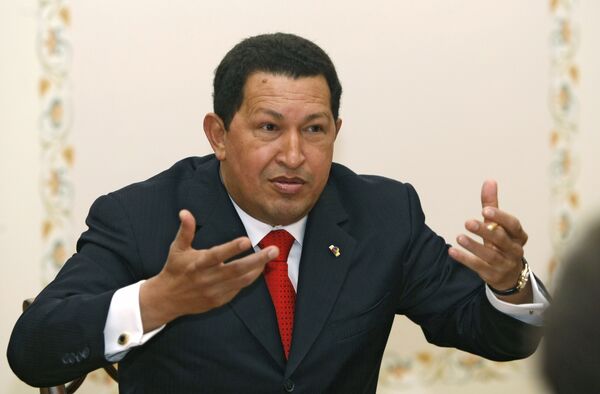On April 2, Prime Minister Vladimir Putin is expected in Venezuela, where large economic, energy and military contracts are to be signed. Scientific and cultural agreements are still in the works.
This move will reinforce the political agreements which presidents Hugo Chavez and Dmitry Medvedev signed in 2008 in Venezuela and in 2009 in Russia.
Putin has met with Chavez more than once, but it will be his first visit to Venezuela.
Most agreements to be signed this time provide for cooperation in oil and gas production and refining, nuclear power plant projects, supplies of cars, trucks and aircraft, and establishment of joint banks. They are almost ready, with only technical details outstanding.
It seems that Hugo Chavez holds some special attraction for the expansive Slavs, but friendship with them could be dangerous for the Venezuelan president. The United States is already looking with alarm at his growing oil, military, economic, nuclear energy and other ties with Russia and nascent relations with Belarus.
Belarusian President Alexander Lukashenko, who visited Venezuela and Brazil in late March, said that Venezuela was a strategic partner, which has been chosen as the bridgehead for a Belarusian "offensive" - in a positive meaning of the word, as he said - on Latin America.
Chavez and Lukashenko have agreed that Venezuela, the largest oil producer in the Western Hemisphere, will supply 4 million tons of oil to Belarus in 2010. The first pilot batch of 80,000 tons is to reach Belarus via the Black Sea already this spring.
Belarus has little regard for technical difficulties, and it also hopes to convince Ukraine to use the Odessa-Brody pipeline to deliver Venezuelan oil to Belarus. So far, Russia is using the pipe in the reverse mode to export its oil.
In return, Belarus will deliver MAZ trucks and tractors to Venezuela.
Lukashenko told his cabinet when explaining the tilt towards Venezuela that the Latin American country is almost "ideal" for cooperation because its relations with Belarus are "transparent and honest." The latter wording was obviously chosen to spite Russia.
On the other hand, Russia's friendship with Venezuela is older and more pragmatic. The two countries are currently spotlighting joint development of oil and gas fields, construction of an aluminum smelter, and supplies of military equipment and licenses to produce it.
Putin and Chavez are expected to approve the deal on the development of the country's largest oil deposit, Junin 6, in a 60:40 venture between Venezuela and Russia. Junin's reserves are estimated at 53 billion barrels of oil.
Putin also plans to close the deal for the supply of 38 Mi-17 multirole helicopters under a contract signed in July 2006. Since 2005, Venezuela has bought $4 billion worth of Russian helicopters, combat aircraft and Kalashnikov rifles.
Russia is prepared to lend Venezuela $2.2 billion for the purchase of 92 T-72 tanks and Smerch multiple-launch rocket systems. The two countries also have other plans.
Meanwhile, Latin American countries have been retreating from the left or center-left positions to the rightwing or centrist ones. But then, the continent has been known to change its political preferences from time to time.
Until late last year, the governments or presidents of Argentina, Brazil, Peru, Ecuador, Venezuela, Chile, Uruguay and Bolivia could be described as leftist or socialist. The "pink" tide began before George Bush Jr., who promoted it by forgetting about its southern neighbors. Barack Obama is resolved to regain his country's positions in its "backyard," which promises more political change. It could be even said that such change has already begun.
Rightwing leaders have replaced socialists in Panama and Chile. Cristina Kirchner, the socialist president of Argentina, is unlikely to be re-elected next year. The rightwing candidate in Brazil is most likely to defeat his leftwing opponent at the 2011 election, and the situation in Peru is very similar.
The position of President Chavez is not very strong either, but even his opponents (excluding rightwing radicals) consider his Russian contracts quite benevolently. In fact, they say that investments made by Russian oil, gas, aluminum and automotive companies are entirely welcome.
The opinions expressed in this article are the author's and do not necessarily represent those of RIA Novosti.
MOSCOW (RIA Novosti political commentator Andrei Fedyashin)

